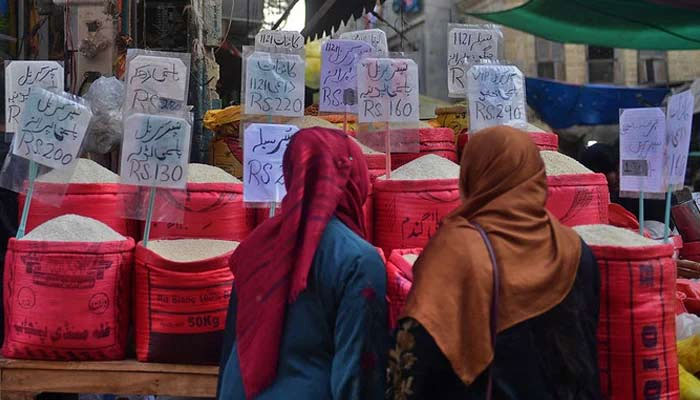Hit by inflation, 68pc Pakistanis cut their expenses: survey
23% of respondents stopped going out for dinner because of rising inflation, whereas 14% claimed they stopped going for outing
ISLAMABAD: Amidst challenging and stressful wave of inflation, a total of 68 percent Pakistanis have reduced their expenses, the latest Pulse Consultant’s survey reveals.
In the study by Pulse Consultant, respondents were asked, “What expenses have you reduced due to inflation” The responses were:
23 percent of respondents stopped going out for dinner because of rising inflation, whereas 14pc claimed they stopped going for outing. Two percent reported they have even reduced their spending on fuel.
Four percent of women participants reported they have reduced their spending on personal care, while two percent male reported the same.
Five percent reported they have reduced consumption of meat, milk and fruit in their daily life.
A total of 15pc of total respondents reported they have reduced electricity consumption. On an overall level basis, 21pc of respondents reduced spending on grocery items. Some 33pc of women said the same.
In addition to this, 10pc of women claimed they now avoid going for shopping, whereas seven percent reported they have stopped the purchase of clothes and shoes.
On the other hand, 32pc of the respondents claimed they reduced nothing and were spending the same on daily commodities as before. Later in this month, Pulse Consultant will launch a second round of urban-based syndicated study gauging the impact
of inflation on purchasing and consumption with a sample of 1,800+respondents —both male and female—in 17 major cities of Pakistan.
-
 Paul Anka Reveals How He Raised Son Ethan Differently From His Daughters
Paul Anka Reveals How He Raised Son Ethan Differently From His Daughters -
 'A Very Special Visitor' Meets Queen Camilla At Clarence House
'A Very Special Visitor' Meets Queen Camilla At Clarence House -
 Jodie Turner Smith Shares One Strict Rule She Follows As A Mom
Jodie Turner Smith Shares One Strict Rule She Follows As A Mom -
 Hailey Bieber Reveals KEY To Balancing Motherhood With Career
Hailey Bieber Reveals KEY To Balancing Motherhood With Career -
 Photo Of Jay-Z, Other Prominent Figures With Jeffrey Epstein Proven To Be Fake
Photo Of Jay-Z, Other Prominent Figures With Jeffrey Epstein Proven To Be Fake -
 Hillary Clinton's Munich Train Video Sparks Conspiracy Theories
Hillary Clinton's Munich Train Video Sparks Conspiracy Theories -
 Fans Slam Talk Show Host For 'cringe' Behavior In Chris Hemsworth Interview
Fans Slam Talk Show Host For 'cringe' Behavior In Chris Hemsworth Interview -
 Woman Jailed Over False 'crime In Space' Claim Against NASA Astronaut
Woman Jailed Over False 'crime In Space' Claim Against NASA Astronaut -
 James Van Der Beek’s Close Pal Reveals Family's Dire Need Of Donations
James Van Der Beek’s Close Pal Reveals Family's Dire Need Of Donations -
 Prince William And Harry's Cousins Attend 'Wuthering Heights' Event
Prince William And Harry's Cousins Attend 'Wuthering Heights' Event -
 Hailey Bieber Turns Heads Just Hours After Major Business Win
Hailey Bieber Turns Heads Just Hours After Major Business Win -
 King Charles' Andrew Decision Labelled 'long Overdue'
King Charles' Andrew Decision Labelled 'long Overdue' -
 Timothee Chalamet 'forever Indebted' To Fan Over Kind Gesture
Timothee Chalamet 'forever Indebted' To Fan Over Kind Gesture -
 Columbia University Sacks Staff Over Epstein Partner's ‘backdoor’ Admission
Columbia University Sacks Staff Over Epstein Partner's ‘backdoor’ Admission -
 Ozzy Osbourne's Family Struggles Behind Closed Doors
Ozzy Osbourne's Family Struggles Behind Closed Doors -
 Dua Lipa Claims Long-distance Relationship 'never Stops Being Hard'
Dua Lipa Claims Long-distance Relationship 'never Stops Being Hard'




